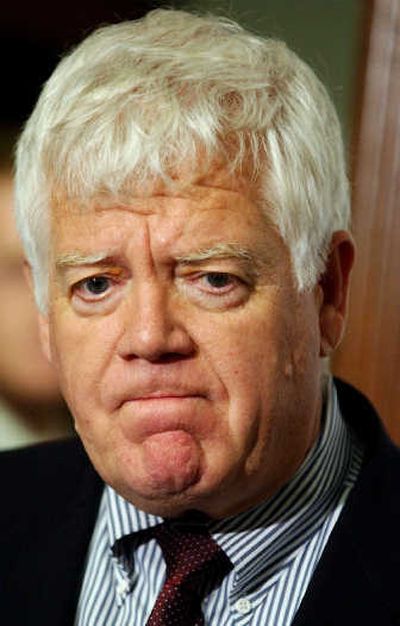McDermott ordered to pay $1 million

WASHINGTON – A federal judge has ordered Rep. Jim McDermott to pay House Minority Leader John Boehner more than $1 million in legal fees in a decade-long dispute over an illegally taped telephone call.
Chief Judge Thomas Hogan of the U.S. District Court for the District of Columbia ordered McDermott to pay Boehner $1.05 million in attorney’s fees and costs, plus about $40,000 in interest. McDermott, a Washington Democrat, also had to pay more than $60,000 in fines and damages, as well as nearly $600,000 in fees to his own lawyers.
McDermott said Tuesday he would not appeal the judge’s ruling.
“It’s dead,” he said of the 10-year dispute with Boehner, R-Ohio. “We’re just cleaning up after the parade. We saved the First Amendment, and it costs a piece of change, but that’s life in the big leagues.”
The Supreme Court in December let stand a federal appeals court ruling that McDermott acted improperly in giving reporters access to an audio tape given to him by a Florida couple who recorded a 1996 telephone call involving then-House Speaker Newt Gingrich, R-Ga., and other GOP leaders. McDermott, at the time a senior member of the House ethics committee, leaked the tape to two newspapers, which published articles on the case in January 1997.
Boehner, one of the GOP leaders heard on the call, sued McDermott, and a federal court found that McDermott had no right to release the recording.
McDermott called the court fight with Boehner “a long and costly battle,” but said the million-dollar judgment was “a small price to pay in defense of so fundamental a principle, and freedom, as the First Amendment.”
Boehner said in a statement that members of Congress have a responsibility not only to obey the law and congressional rules, but also to defend the integrity of those laws and rules when they are violated. Although McDermott was never charged with a crime and maintained that his actions were justified, Boehner took a different view.
McDermott “shattered the bonds of trust between our institution and the men and women we represent in the halls of Congress,” Boehner said.
McDermott has created a legal defense trust fund to cover expenses related to the lawsuit. A report filed with the House clerk shows the trust fund took in about $56,000 in the final three months of 2007, for a year-end total of about $100,000. McDermott said the fund now has about $400,000 in it.
McDermott, who faces little opposition in his bid for an 11th term from his Seattle district, also has more than $612,000 in his campaign account. The Federal Election Commission has generally allowed lawmakers to use campaign funds to pay for legal expenses connected with their office.
Over the years, Boehner has made a number of attempts to settle the case with McDermott. He insisted on three conditions: that McDermott admit he was wrong, apologize to the House and make a $10,000 donation to a charity. McDermott refused.
The U.S. Court of Appeals for the District of Columbia Circuit, in a 5-4 decision last May, said McDermott’s offense in leaking the call was especially egregious since at the time he was a senior member of the House ethics committee.
The appeals court, in its ruling, maintained that McDermott “voluntarily accepted a duty of confidentiality” when he joined the House ethics panel. Thus, the court said, he had no First Amendment right to disclose the tape to journalists.
Boehner was among several GOP leaders heard on the December 1996 call, which involved ethics allegations against Gingrich.